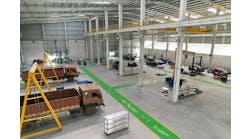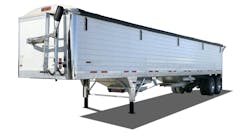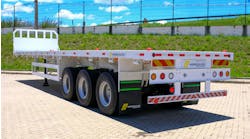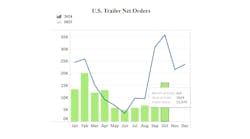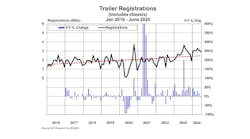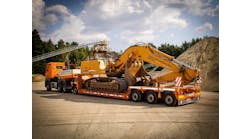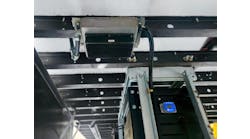Continued significant softness in demand for dry-freight trucks led to an 18% decline for Supreme Industries Inc. (NYSE Amex: STS) in fourth-quarter 2009 consolidated net sales to $46.0 million, from $56.0 million in the same period a year ago. For the full year, consolidated net sales declined 26% to $192.0 million, versus $257.9 million in 2008.
The reported net loss from continuing operations for the quarter was $3.0 million, or $0.21 per share, versus a loss of $2.0 million, or $0.14 per share, in last year's comparable quarter. For the full year, Supreme reported a net loss from continuing operations of $6.4 million, or $0.45 per share, compared with the 2008 loss of $2.1 million, or $0.15 per share.
During the fourth quarter of 2009, the company exited its Silver Crown luxury motorhome business and has reclassified prior-period results accordingly as discontinued operations. The net loss from discontinued operations recorded during the fourth-quarter and full-year 2009 totaled $1.5 million and $2.2 million, respectively. The unprecedented tight credit markets caused by the severe economic recession led to a significant reduction of new motorhome orders and the cancellation of existing orders.
The Company's sales backlog increased during the final quarter of 2009, reaching its highest level in more than a year-up 13% to $68 million at Dec. 26, 2009, versus $60 million at the end of December 2008. The improved backlog was derived from increased demand for buses and armored vehicles, while the truck backlog decreased from the prior year and was quite low when compared with backlogs in more normal economic conditions. Although not reflected in Supreme's year-end backlog, increased quoting activity in most of the company's sales territories, as well as other signs of stabilization in the commercial truck market, have been noted.
Commenting on the results, Supreme President and Chief Operating Officer Robert W. Wilson said: "Starting late in the second quarter of 2008 and throughout 2009, we endured unprecedented and persistently recession-related weak demand in the commercial truck market, which resulted in a 52% year-over-year decline in our unit shipments. This decline is incremental to the 13% decrease in unit shipments experienced in 2008. Based on industry data, we believe that Supreme has not lost market share in the past two years, but instead that the domestic dry-freight industry in particular shrank in response to the worldwide economic crises.
"Although, to date, we have reduced our annualized operating costs in excess of $15 million, we were unable to adjust our cost structure rapidly enough to avoid the losses of the past two years, which were the first in the Company's 35-year history.
"We are still looking for opportunities to make our operations leaner and have implemented meaningful additional cost reductions to be realized in 2010. We also have recently retained consultants to derive further benefits from these and other efforts. The cumulative cost reductions resulted from, among other factors, personnel reductions, salary reductions, suspension of the company's 401K contributions, process improvements, plant closures and consolidations, outsourcing and improved inventory management. These will allow us to be more competitive, as well as provide us with operating earnings leverage when sales improve, either from core truck or other products. To help revenues improve, we have invested in product improvements, technology and our sales organization. In addition, we increased efforts to sell product lines that have reasonable continuing market demand (i.e., buses, armored vehicles, etc.), while pushing hard to secure profitable dry-freight orders as business conditions permit."
"We believe the commercial truck market is poised for a rebound as the average age of fleet vehicles in use is estimated to be more than nine years, compared with the historic average of six years. Some industry analysts are predicting truck sales to increase by double-digits over the next two years. With Supreme's product enhancement strategies, cost reductions and overall market share, we are well positioned for a meaningful improvement in our financial performance if these predictions hold true. However, in the event dry-freight truck demand remains anemic and does not grow from current levels during 2010, we will take additional cost-reduction measures to make the Company profitable while continuing to push for increased revenues from other product groups. Our objective in 2010 is to restore profitability in the first half of the year, maximize cash flows and further reduce debt. We cannot guarantee this outcome but the entire organization is 100% committed to the objective."
